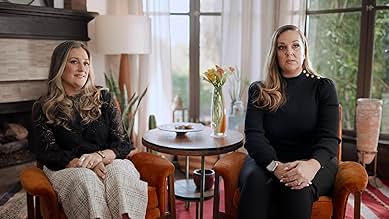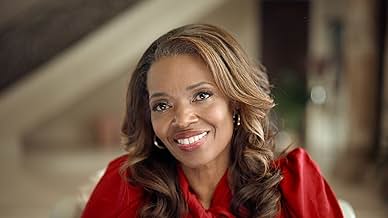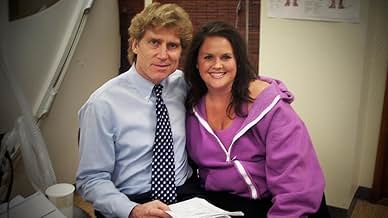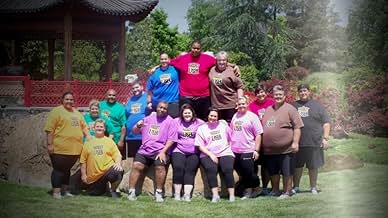Cuerpos de TV: La realidad de the Biggest Loser
Título original: Fit for TV: The Reality of the Biggest Loser
Una mirada entre bastidores del exitoso concurso de telerrealidad, revelando lo bueno, lo malo y lo complejo.Una mirada entre bastidores del exitoso concurso de telerrealidad, revelando lo bueno, lo malo y lo complejo.Una mirada entre bastidores del exitoso concurso de telerrealidad, revelando lo bueno, lo malo y lo complejo.
Explorar episodios
Reseñas destacadas
I found it interesting and watched all 3 episodes. However as others have said, too many stories of people trying to play the victim. Yes, there was corporate greed from the producers, but that's pretty much how the world works. Everyone who went on the show after season 2, knew what they were signing up for. It's just sad that most of the people didn't take the lessons learned and gained all the weight back.
7j_l_
Almost all of these *adult* contestants had watched the show and knew what to expect as far as how intense the trainers were, challenges/temptations, etc... and they still signed up because they "wanted to be on the show so badly." And they also could have left willingly at any time, and they stayed. But still somehow found a way to paint themselves as victims. Joelle is *still* absolutely insufferable. Zero self awareness or accountability. Every contestant was handed a life-changing opportunity to do and accomplish hard things - and knew it would be grueling and sometimes embarrassing. But somehow instead of gratitude, so many of them can only focus on the negative. Like they were owed something. Reality TV - in general - is embarrassing. And that's sort of the point. Whether is housewives or dating shows, you're giving up something (often their dignity) to get something. Stop complaining about it. You knew. Even Tracey, when asked at the end if she'd go back on the show, she couldn't definitively answer - insinuating that possibly yes she would - even after all her complaining.
This show which could or should have been interesting was just a bunch of click bait. It was a reality show about a reality show. People being mad tv did tv things is comical. I remember plenty of these people having a much different story after the show for years but now they have clearly lost their shine so they are coming back for more.
Honestly it was insufferable seeing Bob Harper and the producers acting as if they did mostly good things and not take any accountability for anything they made these poor people go through.
Anyone trying to lose weight should always exercise at their own pace and obviously should not be made to work out until they throw up and the fact that anyone thought this was okay is wild to me but maybe not too surprising as society does seem to hate fat people and that fact that a show like "The Biggest Loser" was ever a thing proves it.
I wish nothing but the worst for not only Bob Harper and the producers but everyone blaming the contestant in the reviews, still i'm glad that this documentary exists and i hope it opened some people' eyes if they didn't know about this already.
Anyone trying to lose weight should always exercise at their own pace and obviously should not be made to work out until they throw up and the fact that anyone thought this was okay is wild to me but maybe not too surprising as society does seem to hate fat people and that fact that a show like "The Biggest Loser" was ever a thing proves it.
I wish nothing but the worst for not only Bob Harper and the producers but everyone blaming the contestant in the reviews, still i'm glad that this documentary exists and i hope it opened some people' eyes if they didn't know about this already.
The biggest losers here, in my view, are the show's creators - profiting off televised humiliation and suffering while feigning selective memory. David Broome said, "It would be hard for me to comment on the sheriff investigation because I just don't remember it." His co-creator JD Roth strikes me as even more objectionable, with that ever-present smirk as he talks about masterminding the show the way a serial killer might reminisce about their victims.
This is a story of reckless TV executives chasing the next big thing, willing to go to any length to get it, yet unwilling to do the basic work of hiring the right professionals - dietitians, chefs, psychotherapists. They missed the chance to use this platform to teach a nation how to choose better food, cook easy healthy meals, work through unresolved emotional issues, and practice genuine self-care. As someone with a graduate degree in dietetics, I see obesity not only as a physical issue but also a deeply psychological one.
The documentary touched on manipulative and unethical challenges, the toll on contestants during and after filming, and the long-term damage, from slower metabolisms to chronic ailments. But it failed to widen the lens to the real backdrop: America's obesogenic environment, where unhealthy, ultra-processed foods are cheaper and more accessible than their healthier counterparts. These sugar- and fat-laden products are exactly what emotional eaters, or those chasing a dopamine hit, are drawn to.
I wish the documentary had gone deeper into how each former contestant ended up at their starting weight and what was going on in their inner world. I suspect the common thread would have been self-loathing and negative self-talk. Tracey Yukich put it best: "You need to cheer for yourself... The show didn't change my life. I changed my life. I did that."
This is a story of reckless TV executives chasing the next big thing, willing to go to any length to get it, yet unwilling to do the basic work of hiring the right professionals - dietitians, chefs, psychotherapists. They missed the chance to use this platform to teach a nation how to choose better food, cook easy healthy meals, work through unresolved emotional issues, and practice genuine self-care. As someone with a graduate degree in dietetics, I see obesity not only as a physical issue but also a deeply psychological one.
The documentary touched on manipulative and unethical challenges, the toll on contestants during and after filming, and the long-term damage, from slower metabolisms to chronic ailments. But it failed to widen the lens to the real backdrop: America's obesogenic environment, where unhealthy, ultra-processed foods are cheaper and more accessible than their healthier counterparts. These sugar- and fat-laden products are exactly what emotional eaters, or those chasing a dopamine hit, are drawn to.
I wish the documentary had gone deeper into how each former contestant ended up at their starting weight and what was going on in their inner world. I suspect the common thread would have been self-loathing and negative self-talk. Tracey Yukich put it best: "You need to cheer for yourself... The show didn't change my life. I changed my life. I did that."
Selecciones populares
Inicia sesión para calificar y añadir a tu lista para recibir recomendaciones personalizadas
Detalles
- Fecha de lanzamiento
- País de origen
- Idioma
- Títulos en diferentes países
- Fit for TV: The Reality of the Biggest Loser
- Empresa productora
- Ver más compañías en los créditos en IMDbPro
- Duración
- 2h 4min(124 min)
- Color
Contribuir a esta página
Sugerir un cambio o añadir el contenido que falta

































